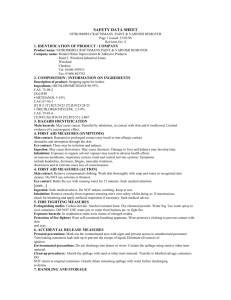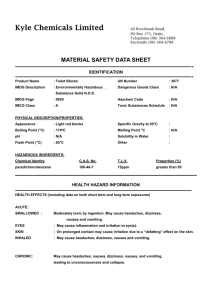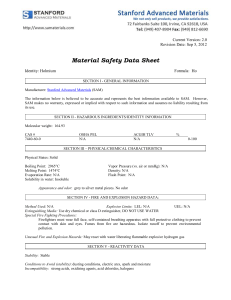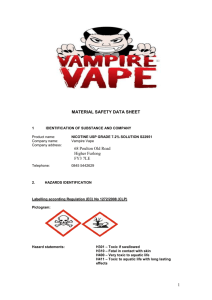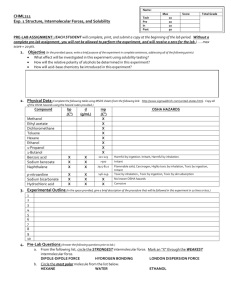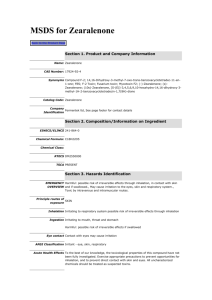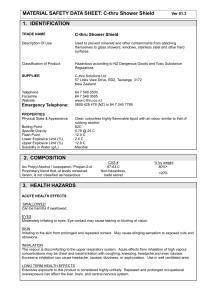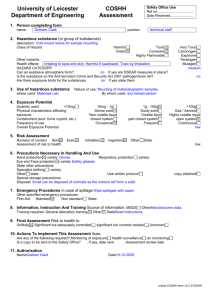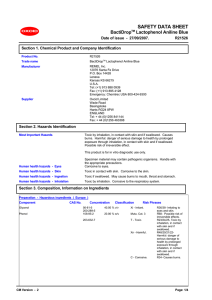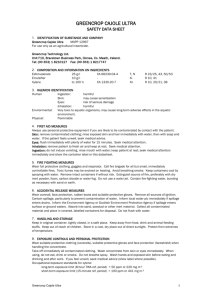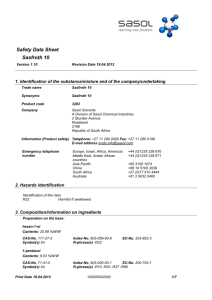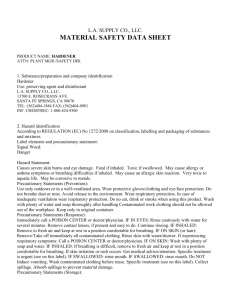Mitomycin Material Safety Data Sheet 1. IDENTIFICATION OF THE
advertisement
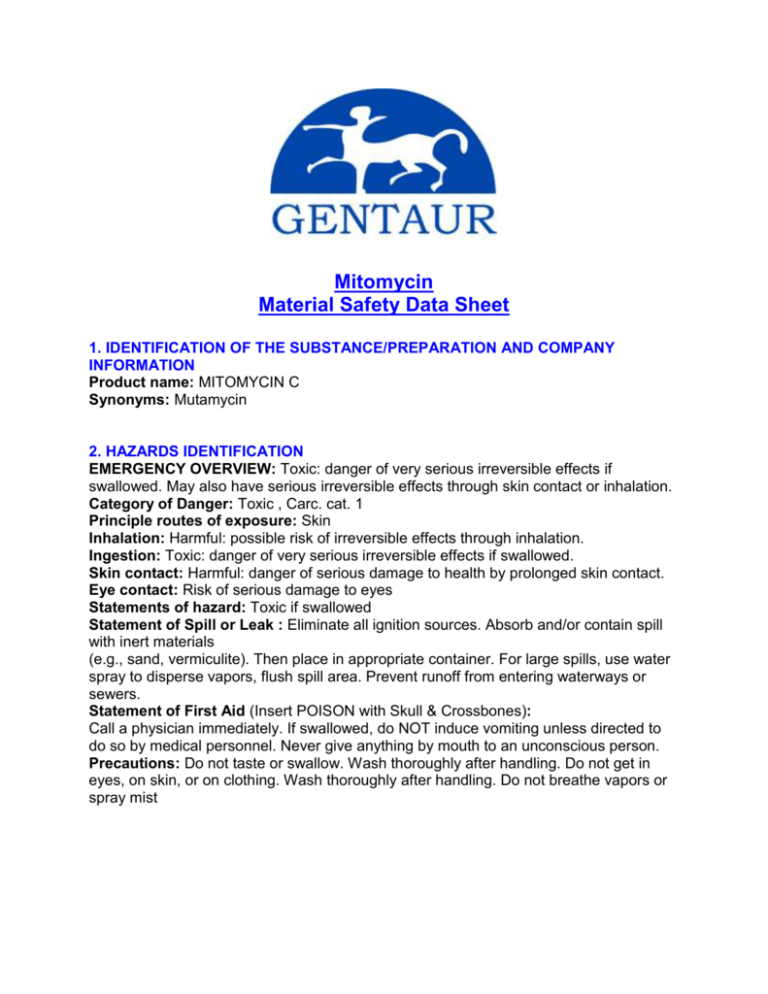
Mitomycin Material Safety Data Sheet 1. IDENTIFICATION OF THE SUBSTANCE/PREPARATION AND COMPANY INFORMATION Product name: MITOMYCIN C Synonyms: Mutamycin 2. HAZARDS IDENTIFICATION EMERGENCY OVERVIEW: Toxic: danger of very serious irreversible effects if swallowed. May also have serious irreversible effects through skin contact or inhalation. Category of Danger: Toxic , Carc. cat. 1 Principle routes of exposure: Skin Inhalation: Harmful: possible risk of irreversible effects through inhalation. Ingestion: Toxic: danger of very serious irreversible effects if swallowed. Skin contact: Harmful: danger of serious damage to health by prolonged skin contact. Eye contact: Risk of serious damage to eyes Statements of hazard: Toxic if swallowed Statement of Spill or Leak : Eliminate all ignition sources. Absorb and/or contain spill with inert materials (e.g., sand, vermiculite). Then place in appropriate container. For large spills, use water spray to disperse vapors, flush spill area. Prevent runoff from entering waterways or sewers. Statement of First Aid (Insert POISON with Skull & Crossbones): Call a physician immediately. If swallowed, do NOT induce vomiting unless directed to do so by medical personnel. Never give anything by mouth to an unconscious person. Precautions: Do not taste or swallow. Wash thoroughly after handling. Do not get in eyes, on skin, or on clothing. Wash thoroughly after handling. Do not breathe vapors or spray mist 3. FIRST AID MEASURES General advice: In the case of accident or if you feel unwell, seek medical advice immediately (show the label where possible). Inhalation: Move to fresh air. Call a physician immediately. Skin contact: Rinse immediately with plenty of water and seek medical advice Ingestion: Call a physician immediately. Do not induce vomiting without medical advice. Never give anything by mouth to an unconscious person. Drink 1 or 2 glasses of water. Induce vomiting if person is conscious. Eye contact: Rinse immediately with plenty of water, also under the eyelids, for at least 15 minutes. Protection of first-aiders: No information available Medical conditions aggravated by exposure: None known 4. FIRE FIGHTING MEASURES Suitable extinguishing media: Use dry chemical, CO2, water spray or "alcohol" foam Specific hazards: Burning produces irritant fumes. Unusual hazards: None known Special protective equipment for firefighters: As in any fire, wear self-contained breathing apparatus pressure-demand, MSHA/NIOSH (approved or equivalent) and full protective gear Specific methods: Water mist may be used to cool closed containers. Flash point: Not determined Autoignition temperature: Not determined NFPA rating: NFPA Health: 3 NFPA Flammability: 1 NFPA Reactivity: 0 5. ACCIDENTAL RELEASE MEASURES Personal precautions: Use personal protective equipment. Environmental precautions: Prevent product from entering drains. Methods for cleaning up: Sweep up and shovel into suitable containers for disposal. 6. HANDLING AND STORAGE Storage:+4°C Handling: Use only in area provided with appropriate exhaust ventilation. Safe handling advice: Wear personal protective equipment. Remove and wash contaminated clothing before reuse. Technical measures/storage conditions: Keep containers tightly closed in a cool, well-ventilated place. Keep container tightly closed in a dry and well ventilated place. Incompatible products: Oxidising and spontaneously flammable products 7. EXPOSURE CONTROLS / PERSONAL PROTECTION Engineering measures: Ensure adequate ventilation, especially in confined areas. PERSONAL PROTECTIVE EQUIPMENT Respiratory protection: Breathing apparatus only if aerosol or dust is formed. Hand protection: Pvc or other plastic material gloves Skin and body protection: Impervious clothing Long sleeved clothing Eye protection: Safety glasses with side-shields Hygiene measures: Handle in accordance with good industrial hygiene and safety practice. 8. PHYSICAL AND CHEMICAL PROPERTIES Physical state: Powder Formula: C15H18N4O5 Molecular weight: 334.3 Melting point/range: No data available at this time. Boiling point/range: No Data available at this time. Density: No data available Vapour pressure: No data available Evaporation rate: No data available Vapour density: No data available Solubility (in water): Soluble Flash point: Not determined Autoignition temperature: Not determined 9. STABILITY AND REACTIVITY Stability: Stable under recommended storage conditions. Polymerization: None under normal processing. Hazardous decomposition products: Nitrogen oxides (NOx)/ammonia/CNMaterials to avoid: Strong oxidising agents Strong acids Strong bases Conditions to avoid: Exposure to air or moisture over prolonged periods. 10. TOXICOLOGICAL INFORMATION Product Information Acute toxicity Components RTECS Number: Selected LD50s and LC50s MITOMYCIN C CN0700000 Oral LD50 Rat : 30 mg/kg Oral LD50 Mouse : 23 mg/kg Chronic toxicity: Chronic exposure may cause nausea and vomiting, higher exposure causes unconsciousness. Local effects: Symptoms of overexposure may be headache, dizziness, tiredness, nausea and vomiting. Specific effects: May include moderate to severe erythema (redness) and moderate edema (raised skin), nausea, vomiting, headache. Primary irritation: No data is available on the product itself. Carcinogenic effects: A known carcinogen. Mutagenic effects: No data is available on the product itself. Reproductive toxicity: No data is available on the product itself. 11. ECOLOGICAL INFORMATION Mobility: No data available Bioaccumulation: No data available Ecotoxicity effects: No data available Aquatic toxicity: May cause long-term adverse effects in the aquatic environment. Severe Marine Pollutants 12. DISPOSAL CONSIDERATIONS Waste from residues / unused products: Waste disposal must be in accordance with appropriate Federal, State, and local regulations. This product, if unaltered by use, may be disposed of by treatment at a permitted facility or as advised by your local hazardous waste regulatory authority. Residue from fires extinguished with this material may be hazardous. Contaminated packaging: Do not re-use empty containers 13. TRANSPORT INFORMATION Proper shipping name: Toxic solid, organic, n.o.s. IATA Hazard Label(s): Toxic Hazard Class 6.1 -Toxic substances - oral Packing group: II Emergency Response Guide Number (ERG): 154 Components U.S. DOT - Appendix A Table 1 - Reportable Quantities MITOMYCIN C RQ = 10 pounds (4.54 kg); also listed as Azirino[2'',3'':3,4]pyrrolo(1,2a)indole-4,7-dione, 6-amino-8-[[(aminocarbonyl)oxy] methyl]-1,1a,2,8,8a,8b-hexahydro8a-methoxy-5-methyl-(1aS-[a.alpha.,8 16. OTHER INFORMATION Disclaimer: The information and recommendations contained herein are based upon tests believed to be reliable. However, MP Biomedicals does not guarantee the accuracy or completeness NOR SHALL ANY OF THIS INFORMATION CONSTITUTE A WARRANTY, WHETHER EXPRESSED OR IMPLIED, AS TO THE SAFETY OF THE GOODS, THE MERCHANTABILITY OF THE GOODS, OR THE FITNESS OF THE GOODS FOR A PARTICULAR PURPOSE. Adjustment to conform to actual conditions of usage maybe required. MP Biomedicals assumes no responsibility for results obtained or for incidental or consequential damages, including lost profits arising from the use of these data. No warranty against infringement of any patent, copyright or trademark is made or implied.
